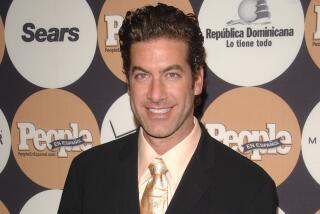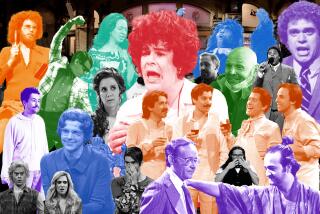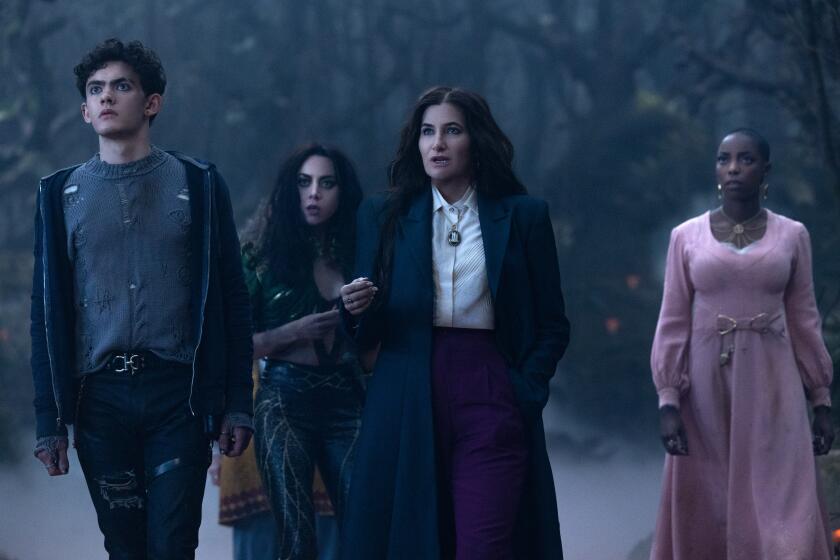Allen Adds an American Accent
In the middle of choreographer-director-dancer-actress Debbie Allen’s hurricane of activity, which includes an upcoming album and a TV special, is a project that has remained a constant for her since the first days of her involvement with “Fame”: “Carrie”--the musical.
“Michael Gore, Dean Pitchford, Lawrence Cohen and I developed ‘Fame’s’ whole musical-dance look,” Allen said. “But the three of them were also cooking up this stage musical.
“When they told me it was based on Stephen King’s novel ‘Carrie,’ I said, ‘It’s based on whaaaat? ‘ But Lawrence had written the film script for Brian De Palma, so they knew what they were doing. I read Lawrence’s script, and they sang Michael’s and Dean’s songs for me in Dean’s workroom. It was so classical in its conception. I told them they should have one of those English boys do it. See, I had just seen ‘Nicholas Nickleby’. . . . “
“Carrie” was one of those on-again, off-again affairs that populate the show-business world--a high-profile production with high-profile contributors who can never manage to coordinate each other’s busy schedules. Script drafts came and went along with directors, but, Allen said, she was always the choreographer.
“Carrie,” as Allen sees it, is an American story needing an American touch. With American song and book writers, lyricist, choreographer, music director, orchestrator, and cast members, the Royal Shakespeare Company’s hands were far across the ocean. Too far for some British theater observers, whom Allen said “came after us with a blowtorch and chain saw. They looked down on the RSC for taking it directly from Stratford to New York. But why not? This was a Broadway-conceived show from the start.”
The weekly grind of TV’s “Fame” made Allen think eclectically in terms of dance styles (“from ballet to jazz to a dance set to ‘Othello’ ”); she said that “Carrie” requires the same kind of broad approach. Because the novel and the musical are about a teen-age girl emerging gradually, then violently, out of her maternal-created shell, she said, “the production team felt that it was important to have a woman on board, to give it a woman’s perspective.
“A lot of the dancing has a sexual edge, but each piece is very different in attitude. The girls in Carrie’s gym class, for instance, want their bodies to be perfect, so their dancing is like that. And there’s Carrie in the middle, not fitting in.”
Stratford co-star and stage veteran Barbara Cook left the show at the end of the British engagement (see accompanying story). But for Allen, Cook is “a great lady with a terrific instrument and a marvelous voice, but wasn’t right (for the role of Carrie’s mother). She wasn’t happy with it, and we weren’t either. It was a mutual separation.”
Allen continually referred to the Stratford “Carrie” as “a work-in-progress.” It has until the April 27 opening at Broadway’s Virginia Theatre to get out of the lab, she said.
“Things need to be clarified and redefined for Broadway. The basic structure is there, but the characters need a little more developing. That’s crucial for me, since I’m always looking at the story and how it affects the characters.
“That’s normal, honey,” Allen said with a laugh. “When I worked with Jerome Robbins on ‘West Side Story’ (in the 1981 revival), he was running around and fretting up to the last hour before curtain. That’s the beauty of performance: the refining of it.”
More to Read
The biggest entertainment stories
Get our big stories about Hollywood, film, television, music, arts, culture and more right in your inbox as soon as they publish.
You may occasionally receive promotional content from the Los Angeles Times.










